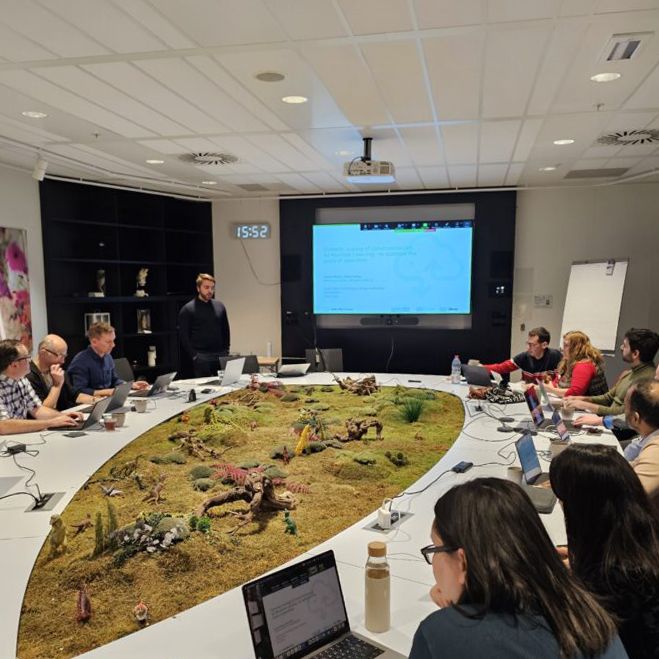
Putting brain health at the centre of the European policy agenda

Whether seen from the point of view of the individual citizen, patient or policy-maker, brain health will gain a growing centrality in the current decade. This development will be a function of three emerging developments.
Firstly, the awareness of good brain health in European societies will rise exponentially. We will be looking after our cognitive abilities well into our later years. There will also be a systemic change in preventing brain disfunctions. The latter will take into account that there are many modifiable risk factors at play, some which are related to broader good health – where as the saying goes “what is good for the heart is good for the brain” – and others are much more brain-specific like the importance of sleep or cognitive exercise.
Secondly the growing extent of brain disease will become more evident, with the ageing of our societies and progress in early diagnosis through identification of new biomarkers. Significantly, while past stigma associated with mental health and neurodegenerative conditions such as Alzheimer’s Disease has not been entirely overcome, there is more openness to tackling it in the public discourse while policy-makers are more willing to address it (1).
Thirdly, the immense scientific and technological progress will bring us much closer to diagnostic and therapeutic breakthroughs. The rising predictive power of integrated brain models will allow us to suggest clinical solutions for treating complex diseases of the brain, such as epilepsy but also neurodegenerative diseases, and overcome the barrier of inaccessibility and complexity of the brain which has inhibited progress.
The revolution in technology is continuing, as seen in the recent announcement of Neurospin’s new magnet, developed in collaboration with CEA and operating at a world-record magnetic field of 11.7 T (2), or in the EBRAINS 3D atlases of the whole brain with unrivalled resolution, different simulators (3) of individual regions of the brain and the whole brain, and the compute and storage power which can make this system work. In terms of the tools for the study of the brain, we are now equipped better than many would have dreamed not so long ago.
Drawing on all these phenomena, there is an ever stronger case for a new European Brain Initiative, in which strengthened and well-funded brain research, policy solutions, radical new innovations and emerging data spaces, should all coalesce to bring about a step-change in how the challenges of brain health are addressed.
Alignment of research agendas: towards the Brain Knowledge Hub
Research is fundamental to making progress in brain health since it is only greater understanding of the brain that can lead to better treatments. Brain science is in the middle of a large transformation. There is an ever-increasing demand to leverage computational advances in the field, and to translate insights into new technologies and solutions for healthcare.
We need to align research agendas and pull research findings, both from the large European programmes, such as the Human Brain Project, the Joint Programme – Neurodegenerative Disease Research and the Network of European Funding for Neuroscience Research, as well as a number of individual EU projects that aim at creating an EU-wide research and innovation ecosystem. This could take the form of a Knowledge Hub on the brain to ensure that research initiatives are better coordinated and knowledge is better shared. The European Commission’s Joint Research Centre is ideally placed to initiate the creation of this platform.
Systemic solutions needed: brain health in the European Health Union
Progress in brain health needs to be achieved not only at the level of advances in individual domains but in the way the area features in the overall public health care system and its organization. In particular, relevant structures need to be in place for early detection and treatment of neurodegenerative disease. Implementing brain health status tracking would make brain data, including real-world data, instantly available to the clinician. Similarly, integration of prevention into primary care is necessary. The risk of inefficient systems failing to allow for maximum value to be realized from the current opportunity is significant.
Given the prevalence of brain conditions, estimated to concern over half of the European citizens (4), with the commensurate socio-economic cost, there is a clear case for prioritising brain health in the emerging European Health Union. As part of this effort, a policy agenda should be developed with the support of the EU4Health Programme, to ensure that systemic innovations, such as Brain Health Status Tracking, are introduced at scale to ensure early diagnosis and monitoring.
Partnership on Brain Health in the latter phase of Horizon Europe will be essential to advance the innovative advances hand-in-hand with industry. The timing will be ripe since we have a new situation emerging with much scientific work coming to the point when findings can be translated into application and move right into the clinic. The European Partnership on Brain Health will also benefit from cutting-edge technology which is now available to study the brain through the EBRAINS Research Infrastructure.
The Partnership instrument is not new, it has been around since 2002 when it was first launched to overcome the fragmentation of the research effort in the EU. New generation partnerships are now implemented in Horizon Europe, stepping up the ambition and demanding clear targets by 2030, for example with regard to solutions for sustainable healthcare systems in Europe, with new diagnostics and treatments. The very objective of Partnerships is to bring the European Commission and private and/or public partners together to address some of Europe’s most pressing challenges through jointly supporting research and innovation initiatives. The partnerships are meant to avoid the duplication of investments and contribute to reducing the fragmentation of the research and innovation landscape in the EU. They bring together key actors from across sectors and come up with the Research and Innovation roadmaps. They are also meant to create “critical scales of investment” to demonstrate “radically new innovations” across Europe.
In the project on the European Brain Research Area (EBRA), together with partners and with the coordinating role of the European Brain Council, we are mapping research in Europe, preparing the ground for a strategy of overcoming fragmentation and creating synergies. Through SEBRA – Shared European Brain Research Agenda report, we are building a joint research agenda in a collaborative fashion, informing the stakeholders of future research to fund. Finally, through the six EBRA clusters, we are bringing specific communities together to advance their respective domains such as neuro-development, food and the brain or severe mental disorders.
Towards radical innovations and leveraging data in the area of brain health
Scientific and technological developments bring us to the cusp of a new era in brain health. Flagship outcomes will need to be supported to ensure that innovations achieve meaningful impact. Three areas, in particular, require attention and focus:
- Solutions to offer personalized brain health monitoring and intervention: processing large amounts of data, including by means of the digital twin approach, generating standardized data collection and storage protocols, and allowing for the provision of high-end analytics for federated data access.
- Using cutting-edge modelling and simulation techniques to further develop innovative therapeutics targeting drug candidates against brain diseases and addressing new diseases in other medical domains where this approach is justified.
- Creating an ecosystem for the development of neurotechnology, benefiting from major progress over the past decade, leading to significant clinical impact through the development of Brain Computer Interfaces for the modulation of brain activity and neuro-prosthetics.
The underlying rationale for all the main innovations in the area of brain health has to do with leveraging the power of data in early prevention, diagnosis and therapeutics of brain disorders. Value of data needs to be unlocked to enable validation of research results across multiple settings and identification of new biomarkers. A step change in reproducibility and replicability can open a new era in brain research.
Enabler-at-large: role of the EBRAINS Research Infrastructure
The process to move from a scientific breakthrough to impact in a domain or application of results outside of the research setting, is a lengthy one. Digitalisation has helped and is making research more reproducible and open. We see the EBRAINS RI work as key in unlocking translational research potential and allowing for quicker transition from basic research to applied solutions.
The timing will also be right because the EBRAINS Research Infrastructure is now in place and it is open to researchers. EBRAINS aims to be the infrastructure of reference for neuroscience and brain health. We already have a treasure trove of data available on EBRAINS, with unprecedented quality and accessibility achieved through FAIR data tools. We are working on creating within EBRAINS a Brain Health Data Solution to enable high-end analytics of clinical data in a federated fashion.
Given the complexity of the brain, one cannot embark on meaningfully studying it on one’s own. In the Human Brain Project, we have neuroscientists working side-by-side with software engineers and computer scientists. It is this culture of collaboration and co-design that can help to move the needle. The EBRAINS Research Infrastructure has been created exactly because no single European country can do what we have now created at the European level, pulling together the expertise of the different countries. Therefore, we are also ready to play an important role in developing the vision needed for the Partnership on Brain Health. EBRAINS can help to ensure that Europe remains at the centre of the global efforts aimed at better understanding the brain, partnering with other main players in the International Brain Initiative.
Achieving the effect of scale
All the current efforts need to be urgently taken to scale. Research priorities defined in the Shared European Brain Research Agenda will need to be translated into significant investments at both the European and national levels. Their alignment will need to be ensured by the Brain Knowledge Hub outlined before. An agenda for the inclusion of brain health in the European Health Union will need to be elaborated with systemic, game-changing interventions at the European level. The Roadmap for the Partnership on Brain Health will need to be drafted with areas for radical new innovations being outlined. These innovations may have to do with the way the public health system in the area of brain health is organized – for example, implementing brain health status tracking would indeed be a radical idea from the point of view of making brain health data, including real-world data, instantly available to the clinician.
In addition, a channel for discussion with the European Commission, the European Parliament, the Member States and industry will need to be created to ensure a shared long-term vision. For this, an EBRA Brain Health Forum with the different stakeholders will be needed. The perspective of patients should be prominently present in the work of the Forum.
For brain health to receive the attention it deserves on the policy agenda, it should be seen as a broader, societal challenge. At the present point in time, a number of developments converge to offer a uniquely positive perspective on possible advances. When embraced thoroughly, they can make a real difference in the lives of millions of European citizens.
This is a longer version of remarks delivered at the European Brain Summit, Brussels, 12 October 2021.
- Some of the recent examples of actions on mental health include the WHO’s Pan-European Mental Health Coalition launched in September 2021 or the Irish Government’s commitment to Mental Health Parity of Esteem Bill 2020.
- https://www.euronews.com/next/2021/10/08/world-s-most-powerful-mri-scanner-delivers-its-first-images-from-inside-a-pumpkin
- “Enabling optimized brain simulation for all”, CORDIS, 18 October 2021: https://cordis.europa.eu/article/id/435208-enabling-optimised-brain-simulation-for-all?WT.mc_id=exp
- Estimates by the European Academy of Neurology: https://www.ean.org/research/resources/the-burden-of-neurological-diseases
News & events
All news & events
- News05 Mar 2025


